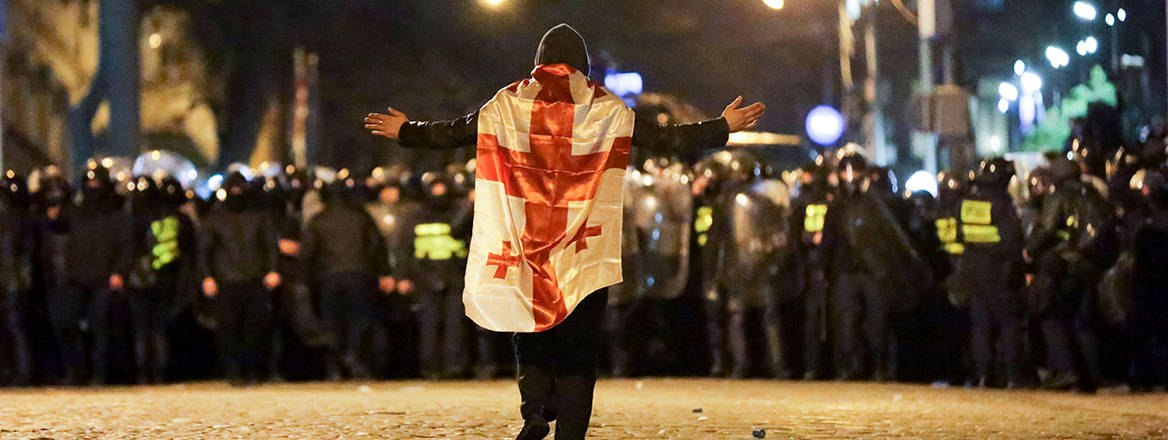Tens of thousands of Georgians took to the streets last week to protest the Georgian government’s attempts to pass a new law on what it termed ‘transparency in foreign influence’, more commonly referred to as a ‘foreign agents’ law and widely believed to be modelled on Russia’s repressive legislation. If fully passed, the bill would have required any media and NGOs even partly financed from abroad to register as ‘agents of foreign influence’.
Following two days of protests and violent clashes with police forces, the public frustration and international reaction forced the government to back down and formally withdraw the bill. However, this ill-fated initiative will have an impact on Georgia’s European aspirations.
On 7 March 2023, the Georgian Parliament approved the draft law on ‘transparency of foreign influence’ in the first reading. Despite public opposition and warnings from Western officials, the ruling Georgian Dream party rushed into approving the law earlier than initially anticipated. The initiative belonged to a parliamentary group called People’s Power, which is particularly well-known for its deeply polarising language when it comes to Georgia’s Western aspirations.
A Russian Law?
The proposed law was promoted under the guise of increasing transparency and openness of funding, and would have applied to the whole spectrum of non-governmental and media organisations that receive more than 20% of their funding from abroad. The law was mainly aimed at organisations that are beneficiaries of Western funding, including those who work with government agencies to help them implement much-needed reforms. And in any case, Georgia already has a legal framework in place that obliges NGOs to declare their funds.
A large majority of the Georgian population believes that the proposed initiative bears a chilling resemblance to the foreign agents law that was adopted in Russia in 2012, and which since then has served as a favourite weapon for President Vladimir Putin to crack down on civil society and media and even to target individual citizens seen as a threat to his authoritarian rule. Coincidentally, back in 2012, the introduction of the foreign agents law was also explained in Russia as an attempt to ensure greater transparency.
If It Works in the US, It Should Work in Georgia
Trying to dispel accusations that they were inspired by the Russian law, ‘People’s Power’ deputies claimed instead that the inspiration for their legislative agenda came from existing US legislation. According to them, the Georgian legal project was an exact translation of the American Foreign Agents Registration Act (FARA), introduced on the eve of the Second World War by the Roosevelt administration in order to restrict pro-Nazi propaganda and still enforced in the US today. As simplistic and absurd as it may seem, the proponents of the Georgian law argued that, if the US has similar legislation, their move cannot be portrayed as undemocratic for Georgia.
A large majority of the Georgian population believes that the proposed initiative bears a chilling resemblance to the foreign agents law adopted by Russia in 2012
What the proponents of the Georgian law failed to say was that, since its adoption, FARA has been modified a number of times, and as of today only around 5% of NGOs operating in the US are registered under the Act, which largely serves to force lobbying companies operating in the US on behalf of foreign governments to declare their business affiliations. There have been no instances when the US government has used FARA to put pressure on or stigmatise media or civil society organisations, the sort of record a Georgian government would find hard to match.
And more awkwardly still, the US Ambassador to Georgia, Kelly Degnan, promptly denounced the claims that the Georgian law had anything to do with FARA by outlining the differences between the US legislation and the Georgian legislative proposals.
So, What About Canada?
By sheer coincidence, and days Georgians marched against their proposed law, the Canadian government launched a public consultation on the creation of a Foreign Influence Transparency Registry. This was also quickly pounced upon by the proponents of the Georgian foreign agents law to claim that the Canadian action both indicated the need for such a measure and served as a justification for the Georgian initiative.
But unlike Georgia, Canada is responding to very obvious concerns about alleged Chinese meddling in the country’s two previous general elections. Also unlike Georgia, the Canadian government is engaging with its public first ‘as well as key stakeholders in the fields of academia, law, business, advocacy organisations, and diaspora communities’ with the objective of taking into consideration a wide range of views before the government in Ottawa makes a legislative proposal. The Canadian government has already launched a consultation page where citizens can provide their input on what kind of organisations should be subjected to registration and which activities should be exempted. Georgian citizens have been deprived of such an opportunity.
Russian Influence
Ironically, many Georgians would welcome efforts aimed at limiting Russian malign influence in their country; the Kremlin has been particularly active in Georgian political affairs, seeking to project its power through local enablers.
There cannot be a third way for Georgia; the choice is between a future with Russia, or one with Europe
In the recent past, pro-Russian political parties and media organisations openly promoting anti-Western and pro-Russian narratives have been on the rise. Yet, so far, no legal efforts have been made to limit the growth in Russian influence. Nor were the proposed legal measures designed to serve the purpose of closing such gaps in national security; instead, the approach was to place all civil society organisations in one restrictive legal basket.
Georgia’s European Future at Stake?
The Western reaction to the foreign agents law was unanimously one of alarm. According to US State Department Spokesperson Ned Price, the bill would ‘stigmatise and silence independent voices and citizens of Georgia who are dedicated to building a better country for their fellow citizens, for their communities’. EU Foreign Policy Chief Josep Borell also denounced the bill and warned that it could seriously affect Georgia’s ties with the EU.
A year ago, Georgia (alongside Ukraine and Moldova) applied for EU candidacy status, and unlike its co-applicants, it has enshrined this objective in its fundamental legislative act. Georgia’s Constitution says: ‘The state constitutional bodies shall take all necessary measures to ensure Georgia's full integration into the EU and NATO’. It goes without question that, at a time when Georgia faces a historic window of opportunity to gain EU candidate status – as Ukraine and Moldova have done – the botched legal proposal is likely to only damage Georgia’s European prospects.
For now, the real ‘people’s power’ has won. The thousands of Georgians waving EU flags forced their government to withdraw the controversial bill. Predictably, the Russians were quick to express their annoyance at the withdrawal of the bill, claiming that the entire affair was Western-orchestrated. The Twitter account of Russia's Ministry of Foreign Affairs in Crimea drew a comparison between the Georgian protests and the Euromaidan movement in Ukraine, and threatened Georgia with another war.
Yet Moscow’s reaction is just a reminder that any move driving a wedge between Georgia and the European and Euro-Atlantic community is ultimately a victory for Russia. There cannot be a third way for Georgia; the choice is between a future with Russia, or one with Europe. Georgian citizens certainly identify more strongly with the latter.
The views expressed in this Commentary are the author’s, and do not represent those of RUSI or any other institution.
Have an idea for a Commentary you’d like to write for us? Send a short pitch to commentaries@rusi.org and we’ll get back to you if it fits into our research interests. Full guidelines for contributors can be found here.
WRITTEN BY
Natia Seskuria
RUSI Associate Fellow, International Security
- Jim McLeanMedia Relations Manager+44 (0)7917 373 069JimMc@rusi.org


